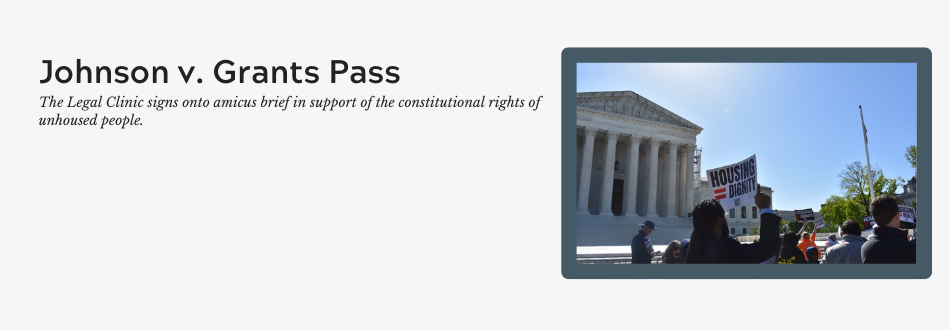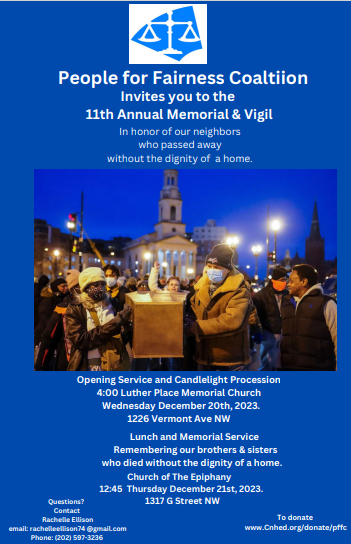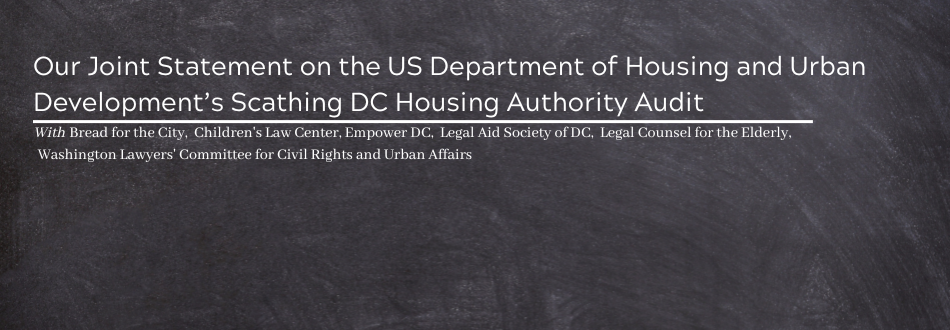With the dust having settled on a number of decision points on rapid re-housing, we wanted to take a moment to update you on what has happened over the last few months and what the families being terminated for reaching a time limit are facing in the next few months:
Bowser administration proposed no new vouchers, started terminations of 2200 families in rapid re-housing, and deprived participants of due process
Mayor Bowser announced in the spring that her administration would cut the budget for rapid re-housing for individuals and families significantly in the next fiscal year. She proposed to “right-size” the program by terminating the rental assistance and services of 2200 families who had been in the program for one year. The Department of Human Services (DHS) acknowledged that less than 1% of families in rapid re-housing can afford market rent on their own when they are exited for time limits. The 2024 Point in Time count revealed that homelessness had increased: despite the count being long criticized for undercounting families, the data showed a 39% increase in family homelessness from 2023 to 2024. Mayor Bowser failed to add any additional funding for permanent housing programs to the budget to provide the support people need to maintain housing stability after rapid re-housing, and proposed regressive and harmful legislation that deprives people of due process if they appeal the time limit exits.
Hundreds asked the D.C. Council to stop the terminations, fund permanent housing vouchers, and pass/fund permanent legislative reform (Rapid Re-Housing Reform Amendment Act)
Many individuals and organizations raised their voices via emails or during hearings, actions, and visits with elected leaders to demand housing justice and reform. Nearly every single councilmember raised preventing the displacement of families in rapid re-housing as a high priority during every public debate and conversation about the budget. Many expressed frustration and disappointment about the position that they were put in this budget season, where they had to restore millions to critical programs just to maintain the status quo.
Council funds new vouchers, fails to stop mass displacement of 2200 families, and guts legal protections for families in rapid re-housing
Despite the Bowser administration’s strangely conflicting advocacy that simultaneously sought to reassure the Council that the families would be fine because the mayor had requested 1300 vouchers from the D.C. Housing Authority (DCHA) (more on that below) and to convince the Council not to fund new vouchers because vouchers “don’t encourage people to pursue economic independence,” the Council increased funding for housing vouchers. By the end of the budget process, primarily thanks to Councilmember Robert White and Chairman Phil Mendelson, the D.C. Council increased new permanent housing vouchers from zero to 619, of which 451 are dedicated to families exiting rapid re-housing. (You can read more about our take on this year’s budget here.) Since that number is far short of the vouchers needed to serve every family hitting a time limit in rapid re-housing and the Council did not pass and fund the Rapid Re-Housing Reform Amendment Act, they did not stop the exits. That is not to say the Council’s efforts were in vain, though—every single housing voucher funded is one household’s lifeboat off the sinking ship of rapid re-housing.
Meanwhile, the Council was engaged in a battle over the legislative language the Bowser administration had included in the budget that stripped rapid re-housing participants, families and individuals, of basic due process rights. While the Housing Committee originally struck the language entirely, DHS claimed the Council couldn’t strike the language and restore constitutional rights without finding millions of dollars—because DHS had baked the deprivation of constitutional rights of the D.C. residents into their budget for the program. The Chairman, in an attempt to restore some procedural rights, managed to eviscerate legal defenses and rights in the program, while stating that he was forced to do so because he, and the Council as a whole, couldn’t find the money to restore the rights.
(As an organization that was deeply in the weeds on this fight, we cannot even begin to express how frustrating and demoralizing this entire process was. Without getting into the very wonky details, suffice it to say that we have never seen such an unpredictable, illogical process, where you could not count on logic, reason, constitutional protections, or even just math to carry the day.)
One bright note– the Council passed an emergency act to require that DHS provide extensions to families when funds are available. We believe that DHS does have resources to provide extensions. Every family that is not provided an extension has the right to appeal that decision, and the right to full due process, including a fair hearing. We strongly encourage every family to request extensions, and to contact us for legal assistance.
The aftermath: families remain in crisis despite significant housing resources
The Bowser administration advocated for 1300 vouchers from DCHA to be dedicated to families exiting rapid re-housing to prevent the families from losing their homes. On July 11, the DCHA Board of Commissioners voted to create a set aside of 1300 vouchers for families who have exited or are exiting rapid re-housing. According to the resolution: “The preference is intended to prevent such families from losing their housing assistance when their [rapid re-housing] subsidy ends.” With these 1300 vouchers, about 400 slots in DHS housing programs, and the 451 new vouchers that will be available in October, DHS has enough housing vouchers to transition nearly every family they had planned to exit from rapid re-housing into permanent housing—preventing mass displacement, eviction, and return to homelessness.
However, when we reached out to DHS to ask if they would commit to keeping families supported until they could transfer to these new housing programs, they said no. Specifically, the DHS representative said: “Unfortunately, due to budgetary limitations, [rapid re-housing] will continue to exit families while expeditiously working to gather required application documents and submit completed applications to DCHA.” It seems that DCHA expected their contribution to the crisis—the 1300 vouchers—to be an intervention that would keep families stably housed. The Bowser administration now has enough housing resources to humanely exit families from rapid re-housing – which is all anyone has ever asked them to do. Yet they are still refusing to do so in way that maintains their housing stability.
Several thousand D.C. families are at risk of losing their rental assistance, falling behind on rent, and subsequently facing eviction—all because the Bowser administration refuses to extend the families for a few months until they can transfer into another housing program. To add insult to injury, DHS recently announced that ERAP—D.C.’s emergency rental assistance program—is out of funds and DHS will not be taking any new applications. Families will not only suffer the well-documented trauma and lifelong consequences of eviction and repeated homelessness, but even when they receive a voucher, they will have a harder time finding and securing a new home, because now they have rental debt and an eviction on their record. They will also be looking for housing while bouncing from place to place or living in an emergency shelter, a program DHS also runs and that is far more costly than sustaining families in rapid rehousing.
Demand housing stability for rapid re-housing families
We ask you to stand with us in demanding that Mayor Bowser keep families in rapid re-housing supported with rental assistance while D.C. government processes their housing applications and transfers them to the new vouchers. We know that D.C. is capable of moving quickly on housing vouchers when it is motivated to do so, but we fear that, if the government isn’t sustaining families in rapid re-housing while they process their applications, it will not be as motivated to move quickly. Stay tuned for next steps.
Action Alert: Sign Open Letter to Mayor Bowser to Keep Families Housed!










